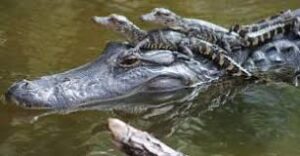Whale Shark
RHINCODON TYPUS
ENDANGERED
LIFE SPAN
HABITAT
RANGE
PREFERRED FOOD
Share
The American crocodile is a species of crocodilian found in the Neotropics. It is the most widespread of the four extant species of crocodiles from the Americas, with populations present from South Florida and the coasts of Mexico to as far south as Peru and Venezuela.
Crocodiles typically live to an age of 50 to 70 in the wild.
American crocodiles prefer smaller vertebrates as prey, but reports of attacks on people are not uncommon. CrocBITE notes that 90 people were attacked between 2008 and 2013, which resulted in approximately 20 deaths.
Who would win an alligator or a crocodile?
Crocodile: Who Would Win in a Fight? Crocodiles win the fight because they’re bigger, stronger, and more aggressive than alligators. Although the chances of them meeting are not great due to population differences and ranges, a match between these two heavyweights could happen in southern Florida
Alligators are usually found in freshwater, slow-moving rivers. They also live in swamps, marshes and lakes. They can only tolerate salt water for brief periods because they do not have salt glands. Alligators are carnivorous.
hey essentially dig tunnels in the mud where they sleep and when they come out of the gator hole, other animals come in and inhabit the area. It can be hard to say how long these gators will sleep in the tunnels, however once the weather starts to warm up, they will come out of the dormancy.

Alligators have a natural fear of humans, and usually begin a quick retreat when approached by people. If you have a close encounter with an alligator a few yards away, back away slowly. It is extremely rare for wild alligators to chase people, but they can run up to 35 miles per hour for short distances on land.
Raccoons are the primary predator, although hogs, otters, and bears have been reported to depredate nests. Juveniles: Small alligators are eaten by a variety of predators including raccoons, otters, wading birds, and fish; however, larger alligators may be their most significant predator.
Can alligators live up to 100 years?

While wild alligators can be expected to live 30-50 years, captive alligators frequently live to 70 years or even older. The oldest alligator currently in captivity lives in the Belgrade Zoo in Serbia and is over 85 years old!
Whale sharks live in tropical climates and warm waters. They spend most of their time away from the shore in deeper waters around 150 feet below the surface (that’s equivalent to the width of an American football field). On the rare occasion that whale sharks do come near the surface, they are really hard to miss! Whale sharks are the largest fish in the world and can grow up to 40 feet long and weigh up to 20,000 pounds. That is the height of two giraffes stacked on top of each other and the weight of two elephants combined. Their mouths are three feet wide and hold more than 350 rows of teeth. Don’t be alarmed if you ever come into contact with a whale shark—they won’t hurt you! Whale sharks are gentle giants. Sometimes, they even get help from remoras and pilot fish that help them stay clean by removing parasites and bacteria from their large bodies. Parasites use whale sharks as a food source and usually aren’t harmful but can sometimes become a nuisance. Be careful to steer clear of the whale shark’s tail—it is extremely powerful and can really harm a person.
Most commonly observed off the coasts of Mexico, Belize, Thailand, South America and Western Australia.
PREFERRED FOOD
Plankton, squid, krill and small fish
How long can a whale shark live?
In the past, scientists have used growth rings from the vertebrae of the 20-meter-long, spotted animals to estimate a life span of about 70 to 100 years.
How big is a full grown what
Do whale sharks eat humans?

According to Metro, whale sharks are filter feeders and won’t eat any humans they encounter. They feed only on plankton and very small fish
1. They’re not whales, but the world’s largest fish. These huge creatures can grow up to 39 feet long.
RESOURCES
- http://www.seethewild.org/whale-shark-facts/
- http://animals.nationalgeographic.com/animals/fish/whale-shark/
- http://oceanservice.noaa.gov/facts/bigfish.html
- https://www.environment.gov.au/marine/marine-species/sharks/whale-shark
- http://www.aquariumofpacific.org/onlinelearningcenter/species/whale_shark
